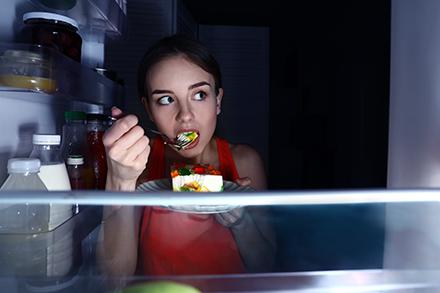Eating Late? Watch Out For Excess Calories

Eating late is the norm among U.S. adults and adolescents. (Photo courtesy of Adobe Stock)
ARS researchers investigate whether late evening eating leads to higher energy intake.
Recently, there has been a great deal of interest in when we eat, particularly when it occurs late in the evening. There is a lot we don't know about eating late, which is why Rhonda Sebastian, a nutritionist at ARS's Beltsville Human Nutrition Research Center Food Surveys Research Group in Beltsville, MD, and her team of researchers analyzed dietary intake data from 9,861 adults, 20 years of age and older, reported in the What We Eat in America, National Health and Nutrition Examination Survey 2013-2016.
For research purposes, late evening (LE) was defined as 8:00PM to 11:59PM. In order to differentiate the participants, those who reported consuming any food and/or beverage in the late evening, other than plain water, were categorized as "LE reporters", and those who did not were categorized as "non-reporters". Sebastian and her team found that 64% of adults were LE reporters. Though this percentage did not vary by sex, it did differ by age, with younger adults more likely than older adults to eat late in the evening. The results also differed among some racial groups. More non-Hispanic black adults ate late in the evening than non-Hispanic white adults.
Both LE reporters and non-reporters ate their first meal of the day at about 7:30 am. However, because they ate late, the time from that first meal to the last was more than two hours longer for LE reporters than non-reporters. Consequently, total daily energy intake was higher among adults who consumed foods and/or beverages in the late evening. LE reporters consumed an average of 2,243 calories on the intake day, whereas non-reporters consumed 1,906 total calories. Energy needs were not assessed, so we don't know whether those who reported foods in the LE were more likely to exceed their individual energy requirements.
Adults consumed a variety of foods in the late evening, from sandwiches to vegetables. About half of the LE reporters consumed snacks and sweets. Nearly all foods in this category – foods such as cakes, cookies, potato chips, ice cream, and candy – are high in fat and/or sugar.
Using the same survey, the research team repeated the analysis for U.S. adolescents ages 12 to 19. Almost two-thirds in this age group were LE reporters. Many of the results mirrored those found for adults; for example, the most highly reported late evening food category among adolescents was snacks and sweets, and more non-Hispanic black adolescents were LE reporters as compared to non-Hispanic white adolescents. However, unlike adults, the percentage who were LE reporters increased with age, with those 16-19 years more likely to be categorized as such than those 12-15 years.
Energy intake from LE foods and beverages among adolescents who consumed them was high, contributing nearly 600 calories on average, or about 28 percent of total daily energy intake. The mean total daily energy intake among LE reporters was almost 300 calories more than non-reporters.
Sebastian's research reveals that late evening food consumption varies: some groups, like older adolescents and younger adults, are particularly susceptible to potential excess energy intake that accompanies this behavior. These results are an important reminder to be cautious of foods one chooses to consume in the late evening because it is well-accepted that consuming more energy than one expends can lead to obesity, which affects a large segment of the U.S. population. By Olga Vicente – ARS Office of Communications
The full reports on both adults and adolescents are available at:
https://www.ars.usda.gov/northeast-area/beltsville-md-bhnrc/beltsville-human-nutrition-research-center/food-surveys-research-group/docs/wweia-data-briefs/
You May Also Like

